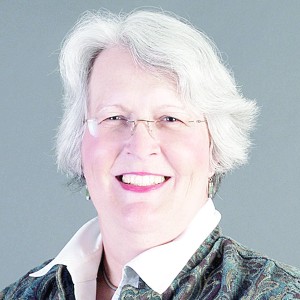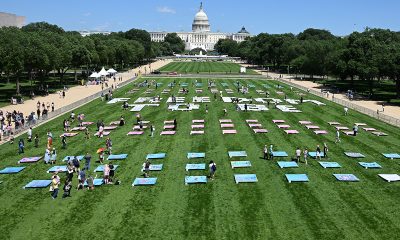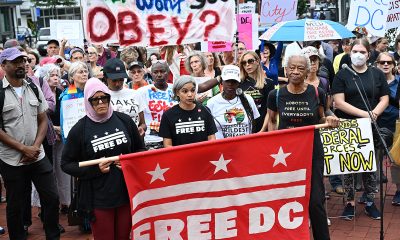National
National news in brief
Trans Houston attorney becomes judge, N.J. adopts anti-bullying bill and more
Transgender Houston attorney becomes judge
HOUSTON — Thirty years ago, Phyllis Frye, a longtime LGBT activist, could have been arrested for wearing women’s clothing in the Houston City Council chamber. The Associated Press reported that Frye, a transgender Houston attorney born as Phillip Frye, fought back tears last week as the mayor appointed her to a municipal bench in the same room where she helped repeal Houston’s “cross-dressing ordinance” in 1980.
The 63-year-old will hear traffic ticket cases and other low-level misdemeanor trials, according to the AP report. Municipal judges are not elected. Frye said she would be the first transgender judge in Texas.
She knows of at least two transgender judges in other parts of the country. Frye applied for the position several months ago and was vetted before being appointed by Mayor Annise Parker, a lesbian, on Wednesday with seven other new associate judges.
“I don’t want to underplay this, because I understand it is very significant,” the AP quoted Frye as saying. “But I don’t want to overplay it either. I don’t want people to think I am anything other than an associate municipal court judge.” There was some quibbling over the appointment from the Houston Area Pastor Council, the AP reported. One local minister said she represented an “anti-family lifestyle.”
Fort Worth drops charges in gay bar fracas
FORT WORTH, Texas — More than a year after a controversial bar inspection at the Rainbow Lounge in Forth Worth, Texas, sent protesters to the streets and vaulted the city into the national spotlight, city officials have dropped charges against four bar patrons, the Fort Worth Star-Telegram reported.
The dismissals came two-and-a-half weeks before Chad Gibson, who suffered a head injury in the June 28, 2009, incident, and George Armstrong had been set to go on trial on public intoxication charges. They had both pleaded not guilty, and Gibson had also pleaded not guilty to assaulting an agent with the Texas Alcoholic Beverage Commission, the paper said.
In a statement released last week, city spokesman Jason Lamers confirmed that the misdemeanor charges against Gibson and Armstrong had been dropped. Public intoxication cases against Dylan Brown, 24, and Jose Macias, 32, were also dropped. Within hours of the fracas at the Rainbow Lounge, local and national protests erupted as patrons accused the officers of using excessive force and questioned whether the bar was targeted because of its mostly gay clientele. Investigations by Fort Worth police and the alcohol commission concluded that no excessive force was used. The commission, however, fired two agents who participated and their supervisor, citing policy violations, the Star-Telegram reported.
La. hospitals announce new visitation rules
NEW ORLEANS — The New Orleans state Department of Health and Human Services announced regulations last week that will require hospitals that receive Medicare or Medicaid financing to drop any visitation policies that discriminate against gays, lesbians and trans people, the New Orleans Times-Picayune reported.
The new rule, which will take effect in January, requires that hospitals have a written policy that must be explained to all patients and allows patients to determine who may visit them, regardless of legal relationships. Hospitals may limit visitation only if there is a clinical reason to do so, according to the rule, which will be added to the conditions for participating in the Medicaid and Medicare programs, the Times-Picayune said.
The rule will trump previous practices in many American hospitals that restricted visitors for some patients — particularly in emergency rooms and intensive care units — to spouses and immediate family, a limitation that often cut off gay and lesbian patients from their partners. The final version, which follows a draft released in June, will go into effect Jan. 16, 60 days after Wednesday’s publication in the federal register and eight months after President Barack Obama first raised the issue in a directive to Health and Human Services Secretary Kathleen Sebelius.
N.J. approves sweeping anti-bullying bill
TRENTON, N.J. — The state legislature voted by overwhelming majorities this week to approve a sweeping anti-bullying bill that could become a model for similar measures across the country, according to media reports and statements from Garden State Equality.
“As someone brutally bullied in my own youth, I can’t even begin to describe how the passage of this bill is a moment of deeply poignant, personal healing for me and thousands of others who have been bullied,” said Steven Goldstein, chair of Garden State Equality. “The best revenge is to make the world a kinder place. This legislation will make our state a kinder, safer place for students for generations to come.”
The Anti-Bullying Bill of Rights applies to schools from kindergarten through 12th grade, strengthens an existing cyber bullying law, applies to bullying off school grounds that carries into schools, and has a section that applies to the state’s public universities, according to Garden State Equality.
It is the first such bill to set deadlines for incidents of bullying to be reported, investigated and resolved. Teachers and other school personnel will have to report incidents of bullying to principals on the same day as a bullying incident. An investigation of the bullying must begin within one school day. A school will have to complete its investigation of bullying within 10 school days, after which there must be a resolution of the situation, the statewide LGBT rights group announced.
The bill passed the Senate 30-0 and the Assembly 72-1.
Philly’s settlement with Scouts draws ire of gay leaders
PHILADELPHIA — Prominent gay leaders in Philadelphia are voicing criticism of a proposed legal settlement between the city and the regional Boy Scouts organization, and a key City Councilman is balking at the deal, the Philadelphia Gay News reported.
The proposal calls for the Boy Scouts group to pay the city $500,000 to buy its 13,000-square-foot headquarters in Logan Square, the focus of a civil-rights dispute that began over the Scouts’ national ban on gay members. The price tag is less than half the appraised value of the building. But the settlement would end an expensive legal fight and the risk that city taxpayers would eventually have to pay the Scouts’ legal bills, now approaching $1 million.
Gay rights advocates say the city’s lawyers are putting financial concerns ahead of principle, appearing to subsidize the Scouts’ discrimination, Philadelphia Gay News reported. City Solicitor Shelley Smith and the Scouts’ attorney, Sandra Girifalco, had issued a joint statement last week describing their agreement as a “win-win situation” for both their clients, predicting that a necessary ordinance would be introduced the next day in City Council. But Councilman Darrell Clarke, whose district includes the property, said he wasn’t ready to introduce anything. The settlement statement had been “premature,” he said, because there hadn’t been enough communication with neighborhood residents or the gay community.
The dispute began with a 5-4 U.S. Supreme Court decision in 2000 that upheld the legality of the national organization’s ban on gay Scouts and troop leaders. That put the Scouts organization in conflict with the city charter’s ban on discrimination rooted in sexual orientation.
Former GLAAD official to head S.F. AIDS Foundation
SAN FRANCISCO — The San Francisco AIDS Foundation has appointed Neil Giuliano as its new chief executive. He’ll start Dec. 13.
Giuliano was previously head of the Gay & Lesbian Alliance Against Defamation (GLAAD) and produced its annual awards programs. He was also the mayor of Tempe, Ariz., for 10 years beginning in 1994. He plans to publish a memoir next year. The Foundation works to end HIV.
National
Peter Thiel’s expanding power — and his overlap with Jeffrey Epstein
Gay billionaire’s name appears 2,200 times in files, but no criminality alleged

There are few figures in modern politics whose reach extends across Silicon Valley, Wall Street, and Washington, D.C., as Peter Thiel’s.
A billionaire venture capitalist, Thiel built his fortune at the dawn of the internet age and has since positioned himself at the highest levels of U.S. technology, finance, and national defense infrastructure. He is best known as a co-founder of PayPal, an early investor in Facebook, and the co-founder of Palantir Technologies — a data analytics firm that maintains significant contracts with U.S., U.K., and Israeli defense and intelligence agencies.
Over the last two decades, Thiel has also built an interconnected network of investment vehicles — Clarium Capital, Founders Fund, Thiel Capital, Valar Ventures, and Mithril Capital — giving him influence over emerging technologies, political candidates, and ideological movements aligned with his worldview. Through these firms, Thiel has backed companies in artificial intelligence, defense technology, biotech, cryptocurrency, and financial services, often positioning himself early in sectors that later became central to public policy debates.
Born in Frankfurt, West Germany, in 1967, Thiel immigrated to the United States as an infant. He later attended Stanford University, earning a degree in philosophy before graduating from Stanford Law School in 1992. As an undergraduate, he founded The Stanford Review, a conservative student publication that opposed what it described as campus “political correctness.” The paper became a platform for combative and contrarian arguments that previewed themes Thiel would revisit in later essays and speeches about elite institutions, democracy, and technological stagnation.
Thiel’s professional ascent coincided with the explosive growth of the dot-com era. In 1998, he co-founded PayPal, helping pioneer digital payment systems that would become foundational to online commerce. When the company was sold to eBay in 2002 for $1.5 billion, Thiel emerged a multimillionaire and part of what would later be known as the “PayPal Mafia” — a loose but influential network of founders and early employees who went on to launch or invest in some of Silicon Valley’s most dominant firms.
In 2004, Thiel made one of the most consequential investments of his career, providing $500,000 in seed funding to Facebook, then a fledgling social network founded by Mark Zuckerberg. He became the company’s first outside investor and later served on its board. That early bet proved extraordinarily lucrative and cemented Thiel’s status as a major venture capitalist with a reputation for identifying transformative platforms before they reached scale.
The same year, he co-founded Palantir Technologies. Initially backed in part by In-Q-Tel, the CIA’s venture capital arm, Palantir developed software — including its Gotham platform — designed to help defense, intelligence, and law enforcement agencies integrate and analyze massive datasets. The company’s tools allow users to map relationships, identify patterns, and visualize complex networks across financial records, communications data, and other digital trails.
Over time, Palantir secured billions of dollars in public-sector contracts. It has worked with the U.S. Department of Defense, Immigration and Customs Enforcement, the Centers for Disease Control and Prevention, and allied governments abroad. Public reporting has documented that its global government contracts exceed $1.9 billion, including agreements with Israeli defense entities — relationships that reportedly expanded following the Oct. 7 attacks in Israel. Critics have raised concerns about civil liberties and surveillance, while supporters argue the company provides essential national security tools.
By the mid-2000s, Thiel was no longer simply a wealthy entrepreneur. He was a financier operating at the intersection of capital, advanced technology, and government — with investments embedded in some of the country’s most sensitive security systems. His political giving would later extend that influence further, including support for candidates aligned with his populist and nationalist leanings– notably Donald Trump in 2016.
As his wealth and influence expanded, so too did his proximity to other powerful — and, in some cases, controversial — figures in global finance.
Among them was Jeffrey Epstein.
Thiel’s name appears more than 2,200 times in documents released so far by the U.S. Department of Justice related to Epstein. A name appearing in legal filings does not, by itself, indicate wrongdoing. However, the extensive references illustrate that Epstein’s social and financial network intersected with elite figures in technology, academia, politics, and finance — including individuals connected to Thiel’s business and philanthropic circles.
Epstein’s legal troubles became public in 2005, when police in Palm Beach, Fla., investigated allegations that he had sexually abused a minor. In 2008, he pleaded guilty in state court to soliciting prostitution from a minor under a plea agreement that was widely criticized as unusually lenient. He served 13 months in county jail with work-release privileges and was required to register as a sex offender. Comparable federal charges can carry significantly longer sentences.
Despite that conviction, Epstein continued to maintain relationships with prominent business and political figures for years. The extent to which members of elite networks remained in contact with him after his guilty plea has been the subject of extensive scrutiny.
Documents released by the Justice Department indicate that individuals connected to Thiel’s philanthropic and investment circles communicated with Epstein after his conviction. One document shows an invitation, sent on behalf of the Thiel Foundation, for Epstein to attend a technology event in San Francisco. Additional financial records and reporting indicate that between 2015 and 2016, Epstein invested approximately $40 million in funds managed by Valar Ventures, one of Thiel’s firms. Other records reflect meetings and correspondence, at times arranged through intermediaries. Epstein also extended invitations to his Caribbean residence.
There is no evidence that Thiel was involved in Epstein’s criminal conduct. The documented interactions do, however, show numerous planned meetings between the two both in the Caribbean (where Epstein’s infamous island is located) and across the world, while also raising questions about why business relationships continued after Epstein had pleaded guilty to a sex offense involving a minor and was a registered sex offender. For critics, that continued engagement speaks to the insular nature of elite finance, where access to capital and networks can override reputational risk.
Palantir represents another overlap. In emails made public through Justice Department releases, Epstein referenced Palantir in correspondence with Ehud Barak, the former Israeli prime minister who also maintained ties to Epstein. The emails do not indicate that Epstein had operational involvement in Palantir or access to its systems, however, they show that he discussed one of Thiel’s most strategically significant companies — a firm deeply integrated into Western defense and intelligence systems — with senior political figures abroad.
Separately, Thiel’s long-running dispute with Gawker Media offers additional insight into how he has exercised power outside traditional political channels.
After Gawker published an article in 2007 that publicly identified Thiel as gay, he later secretly funded litigation brought by professional wrestler Hulk Hogan over the outlet’s publication of a sex tape. The lawsuit resulted in a $140 million judgment against Gawker, which ultimately filed for bankruptcy. Thiel later confirmed his financial backing of the case, framing it as a defense of privacy and a response to what he considered reckless media behavior.
The episode demonstrated Thiel’s willingness to deploy substantial financial resources strategically and, at times, discreetly. It also illustrated how wealth can be used to influence institutions — whether through venture capital, political donations, or litigation.
Taken together, the record does not establish criminal liability for Thiel in connection with Epstein. It does, however, situate him within a dense web of elite finance, national security contracting, political influence, and reputation management. As additional documents related to Epstein continue to emerge, that web — and the decisions made within it — remains a subject of public interest and ongoing scrutiny.
National
Supreme Court deals blow to trans student privacy protections
Under this ruling, parents are entitled to be informed about their children’s gender identity at school, regardless of state protections for student privacy.

The Supreme Court on Monday blocked a California policy that allowed teachers to withhold information about a student’s gender identity from their parents.
The policy had permitted California students to explore their gender identity at school without that information automatically being disclosed to their parents. Now, educators in the state will be required to inform parents about developments related to a student’s gender identity, depending on how the case proceeds in lower courts.
The case involves two sets of parents — identified in court filings as John and Jane Poe and John and Jane Doe — both of which say their daughters began identifying as boys at school without their knowledge, citing religious objections to gender transitioning.
The Poes say they only learned about their daughter’s gender dysphoria after she attempted suicide in eighth grade and was hospitalized. After treatment for the attempt and after being returned to school the following year, teachers continued using a male name and pronouns despite the parents’ objections, citing California law. The Poes have since placed their daughter in therapy and psychiatric care.
Similarly, the Does say their daughter has intermittently identified as a boy since fifth grade, but while their daughter was in seventh grade, they confronted school administrators over concerns that staff were using a male name and pronouns without informing them. The principal told them state law barred disclosure without the child’s consent.
Both sets of parents filed lawsuits in the U.S. District Court for the Southern District of California challenging the state policy that protects students’ gender identity and limits when schools can disclose that information to parents.
The justices voted along ideological lines, with the court’s six conservative members in the majority and the three liberal justices dissenting.
“We conclude that the parents who seek religious exemptions are likely to succeed on the merits of their Free Exercise Clause claim,” the court said in an unsigned order. “The parents who assert a free exercise claim have sincere religious beliefs about sex and gender, and they feel a religious obligation to raise their children in accordance with those beliefs. California’s policies violate those beliefs.”
In dissent, the three liberal justices argued that the case is still working its way through the lower courts and that there was no need for the high court to intervene at this stage. Justice Elena Kagan wrote, “If nothing else, this Court owes it to a sovereign State to avoid throwing over its policies in a slapdash way, if the Court can provide normal procedures. And throwing over a State’s policy is what the Court does today.”
Conservative Justices Samuel Alito and Clarence Thomas indicated they would have gone further and granted broader relief to the parents and teachers challenging the policy.
The emergency appeal from a group of teachers and parents in California followed a decision from the United States Court of Appeals for the Ninth Circuit that allowed the state’s policy to remain in effect. The appeals court had paused an order from U.S. District Judge Roger Benitez — who was nominated by George W. Bush — that sided with the parents and teachers and put the policy on hold.
The legal challenge was backed by the Thomas More Society, which relied heavily on a decision last year in which the court’s conservative majority sided with a group of religious parents seeking to opt their elementary school children out of engaging with LGBTQ-themed books in the classroom.
California Attorney General Rob Bonta expressed disappointment with the ruling. “We remain committed to ensuring a safe, welcoming school environment for all students while respecting the crucial role parents play in students’ lives,” his office said in a statement.
The decision comes as the Trump administration has taken a hardline approach to transgender rights. During his State of the Union address last week, President Donald Trump referenced Sage Blair, who previously identified as transgender and later detransitioned, describing Blair’s experience transitioning in a public school. According to the president, school employees supported Blair’s chosen gender identity and did not initially inform Blair’s parents.

Last year, the court upheld Tennessee’s ban on gender-affirming medical care for transgender minors and has allowed enforcement of a policy barring transgender people from serving in the military to continue during Trump’s second term.

The Comings & Goings column is about sharing the professional successes of our community. We want to recognize those landing new jobs, new clients for their business, joining boards of organizations and other achievements. Please share your successes with us at [email protected].
Congratulations to Gil Pontes III on his recent appointment to the Financial Advisory Board for the City of Wilton Manors, Fla. Upon being appointed he said, “I’m honored to join the Financial Advisory Board for the City of Wilton Manors at such an important moment for our community. In my role as Executive Director of the NextGen Chamber of Commerce, I spend much of my time focused on economic growth, fiscal sustainability, and the long-term competitiveness of emerging business leaders. I look forward to bringing that perspective to Wilton Manors — helping ensure responsible stewardship of public resources while supporting a vibrant, inclusive local economy.”
Pontes is a nonprofit executive with years of development, operations, budget, management, and strategic planning experience in 501(c)(3), 501(c)(4), and political organizations. Pontes is currently executive director of NextGen, Chamber of Commerce. NextGen Chamber’s mission is to “empower emerging business leaders by generating insights, encouraging engagement, and nurturing leadership development to shape the future economy.” Prior to that he served as managing director of The Nora Project, and director of development also at The Nora Project. He has held a number of other positions including Major Gifts Officer, Thundermist Health Center, and has worked in both real estate and banking including as Business Solutions Adviser, Ironwood Financial. For three years he was a Selectman, Town of Berkley, Mass. In that role, he managed HR and general governance for town government. There were 200+ staff and 6,500 constituents. He balanced a $20,000,000 budget annually, established an Economic Development Committee, and hired the first town administrator.
Pontes earned his bachelor’s degree in political science from the University of Massachusetts, Dartmouth.




















